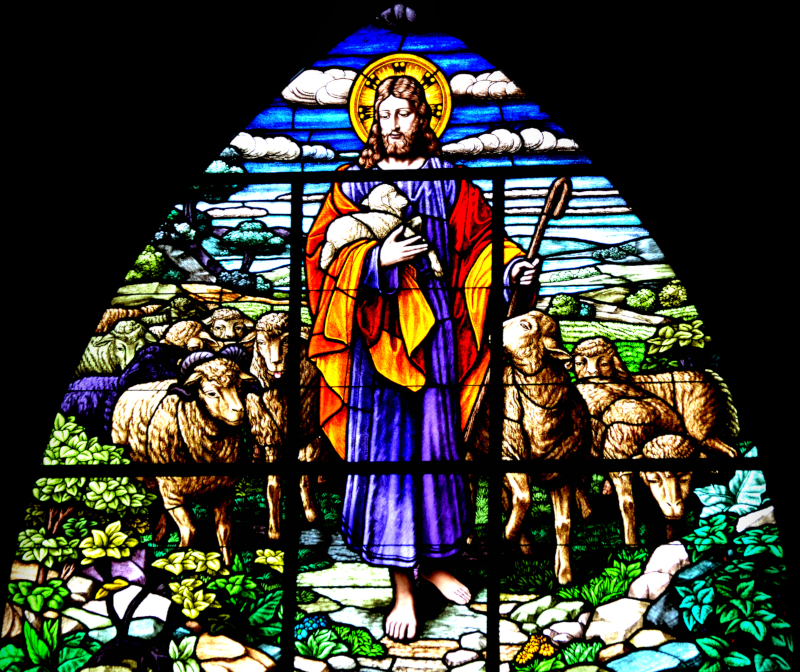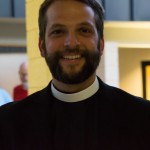Fourth Sunday of Easter
Sunday, May 12, 2019
Lectionary C
John 10:22-30
In this week’s Gospel, John 10:22-30, which takes place during the Festival of Dedication (Hanukkah), the Jewish leaders gather around Jesus and say, “How long will you keep us in suspense? If you are the Messiah, tell us plainly.” In reply, Jesus launches into the same agrarian and pastoral metaphor that we find earlier in John 10 – that of the shepherd.
Now, it may seem to us that prior to verse 30 where Jesus says, “I and the Father are one,” that His response was rather cryptic. But it was anything but that. By Jesus speaking of His sheep, He is then speaking of Himself as a shepherd. And to call oneself a shepherd, in that day and age, especially in the context of conversation about messiahship, is to call oneself a king.
In the Ancient Near East, shepherding was a common metaphor for kingship. It’s everywhere. Across cultures and millennia, kings are referred to as shepherds. Its usage is virtually ubiquitous. So much so that it became what we call a “dead metaphor.”
A dead metaphor is when the original imagery of a metaphor is no longer evoked, at least not necessarily. An example: For how many of us does the term “brand new” conjure up images of a firebrand, that is, of a piece of wood fresh from the fire? Not me. I didn’t even know it was a metaphor until I googled it.
Shepherd is then a de facto synonym for king. That’s why David in Psalm 23 can quickly pivot from agrarian images of pastures and still waters and valleys to “Thou preparest a table before me in the presence of mine enemies.” What does that have to do with shepherding sheep? Nothing. It’s about kingship, about the practice of kings in the ancient world throwing a feast after having won the victory in battle. But David can make a seamless transition. In fact, it’s no transition at all, for he’s been speaking of kingship all along, to say “The Lord is my shepherd” is to say “The Lord is my king.”
And King Jesus, “the great shepherd of the sheep” (Heb 13:20), became a sheep; that is, He became human, and offered Himself on the altar of the cross as the perfect Lamb of God whose precious blood takes away the sin of the world. In Revelation 7, the Lamb is the victorious king who has conquered by His blood poured out in death – “the Lamb at the center of the throne will be their shepherd” (Rev 7:17a).
By his death, Christ conquered death. And in His resurrection, He inaugurated the age to come, an age where the reign of the king of kings is fully realized, where there is no disparity between the life of heaven and the life of Earth, where “God will wipe away every tear from their eyes” (Rev 7:17b).
And through the Church by the power of the Holy Spirit, the reign of the Lamb breaks into our time and space in anticipation of and in witness to that day when “the earth will be filled with the knowledge of the glory of the Lord as the waters cover the sea” (Hab 2:14). So, when Peter raises Tabitha from the dead, He is announcing and implementing the reign of Jesus Christ, the one who conquered death. He is acting as an agent of salvation, restoration, and new creation which is precisely what He was commissioned to be – “As the Father has sent me, I am sending you” (Jn 20:21).
As Christians, we share in the reign of Christ (2 Tim 2:12; Rev 5:10). Our king has commissioned us as His ambassadors and has given us a ministry of reconciliation and new creation (2 Cor 5). Through union with Christ and imitation of Christ, the Church embodies and implements the reign of the shepherd king. And our union with Him is utterly strengthened by the precious blood of the Lamb. “By the blood of eternal covenant” (Heb. 13:20ff), we are transformed into the likeness of Christ and equipped to do His will.
And it is in the Holy Eucharist that we receive that precious blood. It is in the Holy Eucharist that God prepares a table for us and our cup is filled to overflowing. Therein, we share in the shepherd king’s feast of victory and eat in advance of the marriage supper of the Lamb at the end of the age when the Lord’s will shall be done, fully and finally, on Earth as in heaven.
– Father Matt Ainsley is assistant to the rector at Church of the Ascension in Orlando.


